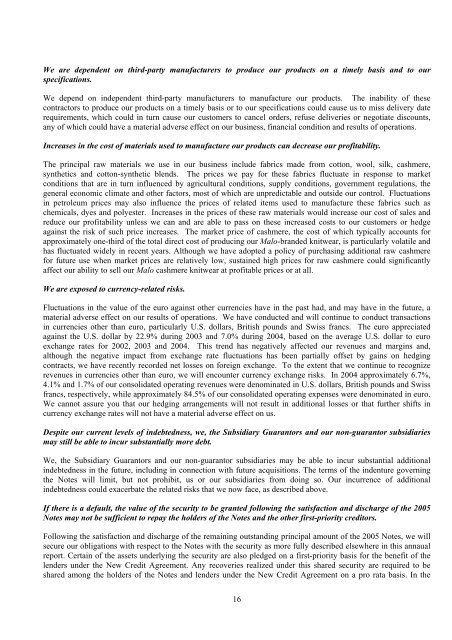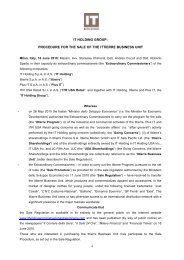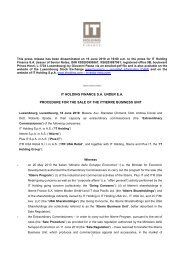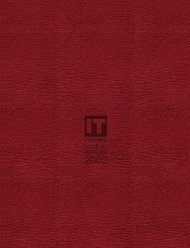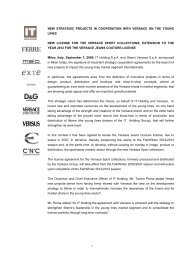You also want an ePaper? Increase the reach of your titles
YUMPU automatically turns print PDFs into web optimized ePapers that Google loves.
We are dependent on third-party manufacturers to produce our products on a timely basis and to our<br />
specifications.<br />
We depend on independent third-party manufacturers to manufacture our products. The inability of these<br />
contractors to produce our products on a timely basis or to our specifications could cause us to miss delivery date<br />
requirements, which could in turn cause our customers to cancel orders, refuse deliveries or negotiate discounts,<br />
any of which could have a material adverse effect on our business, financial condition and results of operations.<br />
Increases in the cost of materials used to manufacture our products can decrease our profitability.<br />
The principal raw materials we use in our business include fabrics made from cotton, wool, silk, cashmere,<br />
synthetics and cotton-synthetic blends. The prices we pay for these fabrics fluctuate in response to market<br />
conditions that are in turn influenced by agricultural conditions, supply conditions, government regulations, the<br />
general economic climate and other factors, most of which are unpredictable and outside our control. Fluctuations<br />
in petroleum prices may also influence the prices of related items used to manufacture these fabrics such as<br />
chemicals, dyes and polyester. Increases in the prices of these raw materials would increase our cost of sales and<br />
reduce our profitability unless we can and are able to pass on these increased costs to our customers or hedge<br />
against the risk of such price increases. The market price of cashmere, the cost of which typically accounts for<br />
approximately one-third of the total direct cost of producing our Malo-branded knitwear, is particularly volatile and<br />
has fluctuated widely in recent years. Although we have adopted a policy of purchasing additional raw cashmere<br />
for future use when market prices are relatively low, sustained high prices for raw cashmere could significantly<br />
affect our ability to sell our Malo cashmere knitwear at profitable prices or at all.<br />
We are exposed to currency-related risks.<br />
Fluctuations in the value of the euro against other currencies have in the past had, and may have in the future, a<br />
material adverse effect on our results of operations. We have conducted and will continue to conduct transactions<br />
in currencies other than euro, particularly U.S. dollars, British pounds and Swiss francs. The euro appreciated<br />
against the U.S. dollar by 22.9% during 2003 and 7.0% during 2004, based on the average U.S. dollar to euro<br />
exchange rates for 2002, 2003 and 2004. This trend has negatively affected our revenues and margins and,<br />
although the negative impact from exchange rate fluctuations has been partially offset by gains on hedging<br />
contracts, we have recently recorded net losses on foreign exchange. To the extent that we continue to recognize<br />
revenues in currencies other than euro, we will encounter currency exchange risks. In 2004 approximately 6.7%,<br />
4.1% and 1.7% of our consolidated operating revenues were denominated in U.S. dollars, British pounds and Swiss<br />
francs, respectively, while approximately 84.5% of our consolidated operating expenses were denominated in euro.<br />
We cannot assure you that our hedging arrangements will not result in additional losses or that further shifts in<br />
currency exchange rates will not have a material adverse effect on us.<br />
Despite our current levels of indebtedness, we, the Subsidiary Guarantors and our non-guarantor subsidiaries<br />
may still be able to incur substantially more debt.<br />
We, the Subsidiary Guarantors and our non-guarantor subsidiaries may be able to incur substantial additional<br />
indebtedness in the future, including in connection with future acquisitions. The terms of the indenture governing<br />
the Notes will limit, but not prohibit, us or our subsidiaries from doing so. Our incurrence of additional<br />
indebtedness could exacerbate the related risks that we now face, as described above.<br />
If there is a default, the value of the security to be granted following the satisfaction and discharge of the 2005<br />
Notes may not be sufficient to repay the holders of the Notes and the other first-priority creditors.<br />
Following the satisfaction and discharge of the remaining outstanding principal amount of the 2005 Notes, we will<br />
secure our obligations with respect to the Notes with the security as more fully described elsewhere in this annaual<br />
report. Certain of the assets underlying the security are also pledged on a first-priority basis for the benefit of the<br />
lenders under the New Credit Agreement. Any recoveries realized under this shared security are required to be<br />
shared among the holders of the Notes and lenders under the New Credit Agreement on a pro rata basis. In the<br />
16


